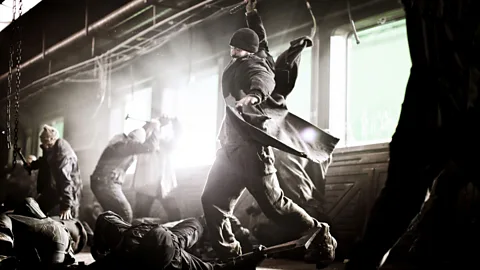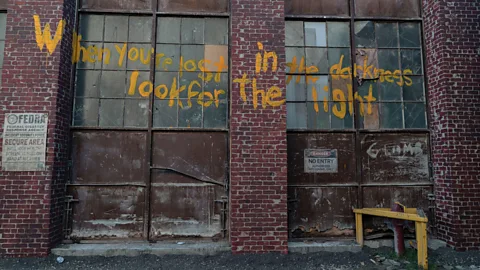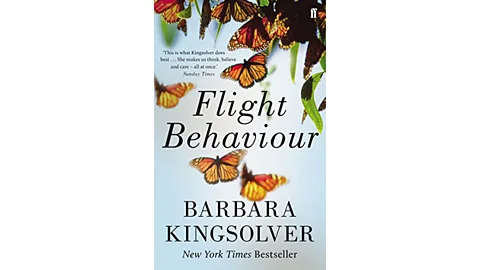What The Last of Us, Snowpiercer and 'climate fiction' get wrong
 Moho Films
Moho FilmsNovels and films that tackle global warming can inadvertently lead to paralysis, writes Tyler Harper.
In the opening scene of The Last of Us, HBO's immensely popular zombie prestige drama, a pair of epidemiologists sit cross-legged on the set of a talk show in 1968. As the playfully mild-mannered host queries his guests about viral threats to the human species, one of the scientists – a man named Newman – responds that fungi, not viruses or bacteria, pose the greatest risk to mankind. The crowd jeers, but Newman presses on undaunted, suggesting that – were Earth's global temperatures to one day rise – an incurable fungal plague could become a very real possibility. Minutes later, we flash forward to a future in which a pandemic has led to the collapse of human civilisation by 2023, the epidemiologist's fungal prophecy fulfilled.
This opening is jarring, not least because it alerts viewers to the catastrophic dangers of planetary warming, only to implicitly critique them for not heeding that same message. Like the disregarded epidemiologist whose concern falls on deaf ears, HBO's drama is clear from the start that its zombie metaphor is meant as a thinly veiled warning about our own, all-too-real climate crisis. The implication of the talk-show scene and its apocalyptic aftermath are straightforward: the future will be a hellscape if you don't listen to the scientists.
In this, The Last of Us is like most works that belong to the ever-expanding roster of cultural products given the moniker "climate fiction". Coined by the environmental activist Dan Bloom around 2008, "cli-fi" is the term used to describe a loose genre of novels, films, and other forms of media that depict climate change, generally through the lens of speculative or science fiction. Spanning bona fide literary classics like Octavia Butler's Parable of the Sower to densely allegorical (and shamelessly pretentious) films like Darren Aronofsky's Mother!, works of cli-fi are commonly apocalyptic in both tone and content. And like The Last of Us, they caution their audience about the world to come.
Public discourse around this new genre has been largely unquestioning. Novels and films about climate change are frequently described by the media as "prescient" or "prophetic", and invariably as offering a "dire warning" about the future. What's more, climate works are nearly always heralded as a kind of call to arms. We are led to believe that reading or watching climate fiction is going to inspire activism, that "cli-fi" can foment an appetite for real societal change either by "scaring audiences straight" or by communicating climate science more persuasively than actual climate scientists. These are assumptions that have been part of public discussion about "climate fiction" from the very beginning.
The first major article about this emerging genre, a 2015 piece in The Atlantic, bore the lofty title: "Climate Fiction: Can Books Save the Planet?" This is a question that has been repeated endlessly in the years since. "Can Climate Fiction Inspire a Response to Help Save the Planet?" The Independent queries. The New Yorker wonders "Can Science Fiction Wake Us Up to Our Climate Reality?" while Smithsonian Magazine asks "Can Climate Fiction Writers Reach People in Ways that Scientists Can't?" The answer in every case is assumed to be "yes." The Guardian cuts to the chase by simply providing a list of climate "Stories to Save the World."
Truly transformative?
Yet, what is missing from the innumerable articles like these – articles that assert that climate fiction will inspire climate action – is any actual evidence that this is the case. Instead, claims about climate fiction's transformative impact are repeated by the media as settled dogma, as though there is a straight and obvious line to be drawn between reading a novel about the climate crisis and becoming a radical environmentalist.
Don't get me wrong, I desperately wish this were true: I am a literary scholar who researches and writes about climate fiction. I have given interviews and published articles on the genre in both academic journals and major media outlets. I teach a course called "Climate Fiction". Yet, the more I have immersed myself in "cli-fi" over the past decade, the more I have come to feel uneasy about the genre and the media's claims about its salvific potential. In fact, I not only worry that "cli-fi" might not be an effective form of environmental expression – I have come to believe that the genre might be actively dangerous, stunting our cultural ability to imagine a future worth living in or fighting for.
 Moho Films
Moho FilmsPart of the problem is that the genre – which is almost exclusively dystopian, operating in the model of "cautionary tale" – traffics in the kind of apocalyptic rhetoric that has long been shown to demotivate consumers of environmental media. Novels like Paolo Bacigalupi's The Water Knife or films like Bong Joon-Ho's Snowpiercer might be riveting climate thrillers, but their bleak storytelling doesn't exactly inspire the kind of can-do attitude that might help motivate their audience to get involved in the climate struggle. Indeed, since I began teaching climate fiction a few years ago, I have been struck by how many of my students – a number of whom are involved in the Youth Climate Movement – became demoralised after engaging with such works; convinced, at least momentarily, that climate activism is pointless.
When I share my students' deflated reaction to "cli-fi" novels and films with Danielle Endres, an expert on environmental communication at the University of Utah, she is not surprised. "Apocalyptic rhetoric sparks paralysis, even among the motivated," observed Endres. "If we only see the future as a set-in-stone catastrophe, it justifies the idea that we don't have to take action." Nichole Seymour, a cultural theorist whose book Bad Environmentalism critiques the doom-mongering in climate discourse, concurs that the "scared straight" model doesn't work. "We've long held that people are just lacking information about climate change and that's why they're not acting. But now we're starting to see the opposite: that the more you know – if the knowing is mainly bad news – the more paralysed and hopeless you feel."
These viewpoints are echoed by Katherine Buse of the University of Chicago, a scholar who researches the relationship between climate literature, climate policy, and climate science. According to Buse, there is a mismatch between how climate novelists imagine the future and how climate scientists forecast it: she notes that climate modellers are at great pains to frame the future as a "possibility space" in which a variety of different futures could unfold, depending on what actions we take in the coming years. However, like Endres and Seymour, Buse observes that climate fiction can often reproduce the opposite feeling: that there is only one possible future, and it will be irredeemably catastrophic.
 HBO
HBOYet, cli-fi's apocalyptic tenor is not its only problem: the genre is also a victim of the unreasonable expectations of both members of the media and academics who insist that "cli-fi" is a form of climate activism. Smaran Dayal, a scholar of Afrofuturism and an expert on Octavia Butler, notes that this common assumption is both flawed and self-aggrandising. "Literature is often assumed by literature professors to have an automatic activist function, which it absolutely does not," Dayal says with a laugh. "It's a controversial thing for us as literature professors to say, but you are disconnected from the world if you think that people are reading novels as inspiration to go and organise on the streets. We like to assume a smooth transition from reading Octavia Butler to becoming a revolutionary, but that's just not how it works."
Matthew Schneider-Mayerson, a literary critic who authored the first empirical study that examined the impact of "cli-fi" on readers' environmental attitudes, agrees that we should be more realistic about what tangible impacts we can expect from the genre. His study of reader responses to climate fiction found that novels that depict catastrophe "may actually be hindering [the] goal of heightening environmental consciousness" by producing feelings of hopelessness just like those experienced by my students. He also discovered that cli-fi novels are mostly consumed by people who are already worried about and believe in climate change, so the genre has a "preaching to the choir" problem that also limits its ability to recruit new environmentalists.
 Harper Collins
Harper CollinsYet, his research does suggest that climate stories that employ a positive frame – particularly those that focus on resilience or innovation – might be able to inspire readers to act. He concedes that examples of non-dystopian climate fiction are few and far between, but he highlights Barbara Kingsolver's Flight Behavior or Clara Hume's Back to the Garden as promising examples. (To this I would also add stories like Rebecca Roanhorse's Trail of Lightning, Becky Chambers' A Psalm for the Wild-Built, Grist's ongoing "Imagine 2200" project, or just about any novel by Kim Stanley Robinson).
Schneider-Mayerson believes that climate fiction shouldn't be the main focus of criticism. "The real problem is that the vast majority of fiction published today does not acknowledge the reality of climate change. Climate fiction is such a smaller portion of everything that's being read today. It's valid and valuable to criticise it and ask what it could be doing differently, but the bulk of criticism should go to non-climate fiction that portrays the natural world as a stable and reliable backdrop to human affairs," he says. "The reality is that those works are essentially all fantasy now."
Every scholar I talk to holds out hope – some more, some less – that there are forms of environmental art that might succeed in shaping the public's imagination for the better. But they are equally clear that "cli-fi" is certainly not the panacea that was promised, and that as long as it continues to operate in a mode of unremitting doom, it will never live up to its potential. Perhaps the first step toward a better climate fiction, then, is to stop clinging to the sort of magical thinking which holds that a novel can save the world; to be clear-eyed about what tangible impact we can expect from a paperback.
Here, I am reminded of Socrates, who suggests in Plato's Republic that there is no place for poets in a well-running city. Socrates' quibbles with poetry are manifold, but the core of his objection is that literature confers on its audience the false sense of having taken real action – it provides readers with the feeling of war without the risk of combat, the feeling of love without the hazards of romance. That is, the problem with a certain kind of literature is that it gives us the sense that we have really done something noble, when in fact we have done nothing loftier than sit on the couch and read a book.
Love books? Join BBC Culture Book Club on Facebook, a community for literature fanatics all over the world.
Love film and TV? Join BBC Culture Film and TV Club on Facebook, a community for cinephiles all over the world.
And if you liked this story, sign up for the weekly bbc.com features newsletter, called The Essential List. A handpicked selection of stories from BBC Future, Culture, Worklife and Travel, delivered to your inbox every Friday.
